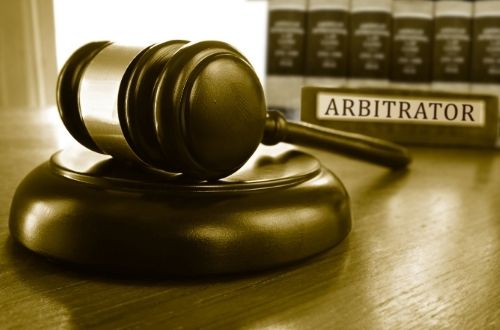Resolve construction contract disputes by commercial arbitration

1. Characteristics of construction contract disputes
Associated with the development of our country’s economy today, the construction industry is considered one of the most groundbreaking fields in the country’s development process. However, this field of architecture is also increasingly controversial. According to congbobanan.toaan.gov.vn, a website that posts judgments and decisions of the Supreme People’s Court, from the beginning of 2022 to June 2023, the court has issued 200 judgments and decisions on legal disputes. construction contract, excluding cases resolved at the Vietnam International Arbitration Center.
Construction disputes often arise for many reasons, but mainly from violations by investors or contractors. For example, the investor may violate the payment schedule according to the work volume, arbitrarily change the work volume or technical requirements without the agreement of the construction contractor. ,… As for contractors, disputes may arise due to violations of construction not following the design, not ensuring project quality standards, not completing correct and complete payment documents and documents. finalizing the contract, not performing warranty obligations after completing the project,…
From that reason, some typical contract disputes include:
Construction disputes due to breach of payment obligations under the contract
Disputes due to violation of payment obligations according to contractual progress are considered the most common disputes among construction disputes. The disputing parties may be between the investor and the contractor or between the main contractor and subcontractors. The common characteristics of both of these disputed relationships stem from the fact that the contractors have completed their construction obligations under the contract but the investor/main contractor has not fully paid for the amount that the contractor paid. The contractor has already completed the work or may seek to cause difficulties or delay payment, causing economic loss to the contractor, leading to disputes.
Construction contract disputes due to failure to ensure construction progress and project quality
In the field of construction, progress and quality of works are important factors that are often strictly regulated in construction contracts between contractors and investors. However, during the construction process, due to the impact of many different subjective and objective factors such as weather, epidemics, capital conditions, human resources, etc., the contractor did not execute the project reliably. about progress or lack of assurance about project quality. This leads to a dispute between the investor and the construction contractor regarding the request for fines for breach of contract and compensation for damages caused by the breach of contract.
Construction contract disputes due to failure to fulfill warranty obligations
According to the provisions of construction law, the warranty period for construction items and works is 12 months or 24 months or more (depending on project level and investment capital source) from the date accepted and put into use. Accordingly, to ensure the warranty, when signing the contract, the parties agree to retain a certain percentage of the contract value (usually about 3% to 5%) to ensure the project warranty obligation. In case after being put into use, within the warranty period, the investor discovers some technical errors in the project and requires the contractor to repair those defects, but the contractor does not do so or does not comply. did not run out, failed to ensure the warranty obligations, but intentionally extended the time until the warranty period expired to request the investor to pay the remaining amount, leading to disputes between the parties. .
Construction contract disputes are caused by one party unilaterally terminating the contract ahead of schedule
During the construction process, the investor and the contractor inevitably have conflicts of interest, fail to properly perform their contractual obligations, or for their own reasons, either party terminates the contract. contract ahead of time. When either party terminates the contract, damage may occur to the other party. The inevitable consequence is that disputes will arise between the parties regarding the request for sanctions for breach of contract and compensation for damages caused by the violating party.
2. Why should commercial arbitration be used in construction?
Using commercial arbitration helps parties involved in construction contracts resolve disputes effectively, quickly and with little damage to the cooperative relationship, thereby contributing to ensuring success and progress. project level. These are the reasons businesses should choose commercial arbitration to resolve construction disputes.
Fast Resolution: Arbitration is often faster than traditional court processes, helping parties save time and costs, and minimizing disruption during construction projects.
High Flexibility: Parties can agree to select arbitrators, set rules and dispute resolution processes to suit the specific needs of the project, providing flexibility and convenience.
Information Security: The arbitration process is usually confidential and confidential, helping to protect commercially and technically sensitive information of the parties involved.
Reasonable Costs: Although arbitration costs may be higher in some cases, overall costs can be lower than dragging a dispute through court, thanks to the simplicity and time of the process. resolved quickly.
International Enforcement: Arbitral awards are often recognized and enforced in many countries thanks to the 1958 New York Convention on the recognition and enforcement of foreign arbitral awards. This is especially important in international construction projects.
Reduce Stress and Maintain Relationships: The arbitration process is less adversarial than court, helping to maintain and even improve cooperation between project parties, which is especially important in long-term projects or long-term cooperation.
3. Construction contract dispute resolution process
With the nature of a civil contract dispute, the dispute resolution procedure at Commercial Arbitration is therefore carried out in accordance with the provisions of the 2015 Civil Procedure Code and the 2010 Commercial Arbitration Law.
Step 1. Arbitration Agreement:
- The parties must have an express arbitration agreement in the contract or through a separate document, agreeing that any dispute arising out of or related to the contract will be resolved by arbitration.
Step 2. Initiate Arbitration
- Submit a request: The party with the dispute submits a request to resolve the dispute to the Arbitration Center (which can be the Vietnam International Arbitration Center – VIAC or another arbitration center chosen by the parties).
- Content of the request: The request must include information about the parties, the content of the dispute, specific requests, and accompanying documents and evidence.
Step 3. Establishment of Arbitration Council
- Appointment of arbitrator: The parties can agree on the appointment of an arbitrator. If no agreement can be reached, the Arbitration Center will appoint an arbitrator to replace the parties.
- Establishment of the Arbitration Council: The Arbitration Council consists of one or more arbitrators, depending on the agreement of the parties or the regulations of the Arbitration Center.
Step 4. Preparation session
- Preparatory meeting: The Arbitration Council will hold a preparatory meeting to determine the issues to be resolved, the time and location of the official meeting, and other related procedures.
Step 5. Dispute resolution meeting
- Formal meeting: The Arbitration Council will hold a meeting to review and evaluate evidence, listen to presentations by the parties, and discuss related issues.
- Presentation of evidence: The parties have the right to present evidence, arguments and their requests before the Arbitration Council.
Step 6. Arbitration Award
- Making a decision: After reviewing all the evidence and arguments, the Arbitration Council will make a decision. The arbitrator’s award is final and takes immediate effect.
Notification of judgment: The judgment will be sent to relevant parties.
Step 7. Enforcement of Arbitration Award
- Execution of judgment: Parties voluntarily execute the judgment. If the requested party does not voluntarily execute, the requesting party may request a civil judgment enforcement agency to carry out the enforcement.
4. How to resolve disputes using Bigboss International Commercial Arbitration Center
To resolve disputes by commercial arbitration at BBIAC. Customers can write in the contract one of the following two contents:
4.1. Model Arbitration Clause
“Any dispute arising out of or related to this contract shall be resolved by arbitration at the BIGBOSS International Commercial Arbitration Center (BBIAC) in accordance with its Arbitration Rules.”
In addition, the parties may add:
(a) the number of arbitrators is [one or three].
(b) the place of arbitration is [city and/or country].
(c) the law applicable to the contract is [ ].*
(d) the arbitration language is [ ].** Note: *
Only applicable to disputes with foreign elements **
Only applies to disputes with foreign elements or disputes in which at least one party is a foreign-invested enterprise.
4.2. The Model Arbitration Clause applies to summary proceedings
“Any dispute arising out of or in connection with this contract shall be resolved by arbitration at the BIGBOSS International Commercial Arbitration Center (BBIAC) in accordance with its Rules of Arbitration. The parties agree that the arbitration proceedings will be conducted in accordance with the Summary Procedures set out in Article 37 of the BBIAC Arbitration Rules.”
In addition, the parties may add:
(a) the place of arbitration is [city and/or country].
(b) the law applicable to the contract is [ ].*
(c) the arbitration language is [ ]. **
Note:
* Only applies to disputes with foreign elements
** Only applies to disputes with foreign elements or disputes in which at least one party is a foreign-invested enterprise.
